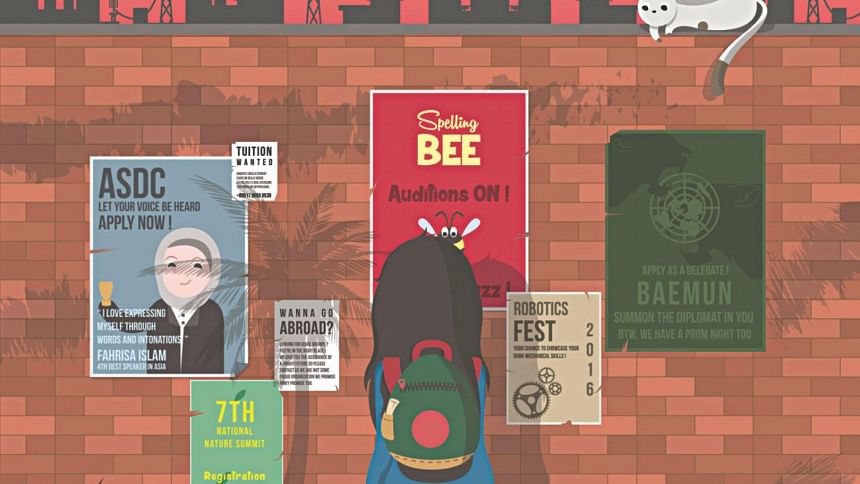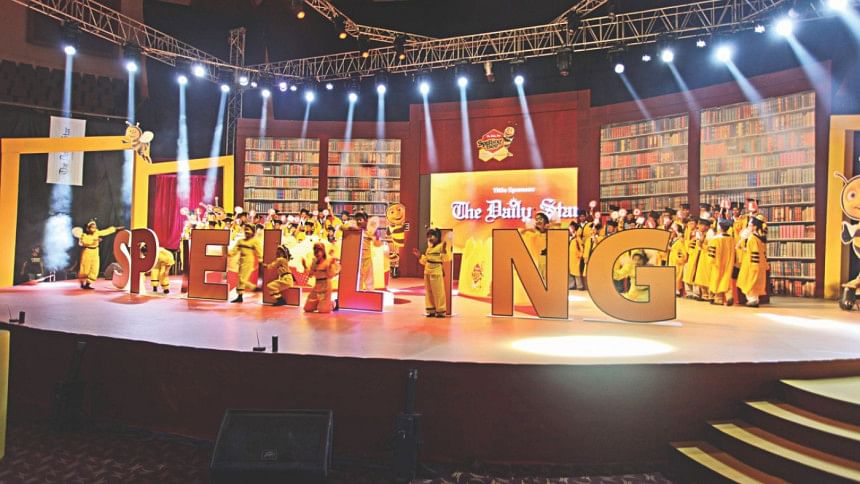Student Competitions in Bangladesh

If you think only academics are the most important aspect of a student's life, just look around. You're bound to find students winning medals at Olympiads, flying abroad for international debate championships, or taking quizzes just for the fun of it. The student competition scene in Bangladesh, right now, is buzzing.
Debate is the practice that nurtures the skills of logical analysis and eloquence. Bangladesh boasts a rich debating culture, and school debate competitions are a huge part of that. Bangladesh Debate Council (BDC) recruits a team of five members every year for the World Schools Debating Championships (WSDC). A considerable number of debate competitions are held at different schools throughout the year in both Bangla and English, and in a number of different formats. The English debate scene is mostly dominated by English medium schools, although a handful of Bangla medium institutions have had success in recent years. Bangla debate, on the other hand, sees little participation from English medium schools, and that is a place where we hope to see improvement in the future.

Noshin Saiyara, from Viqarunnisa Noon School and College, began debating back in 2013, and she has seen this world evolve and herself with it. "It's a pleasant feeling to spend my time doing what I love, which is to think about the issues of the world and deliver analysis, and getting something out of it in return. The rivalries and healthy competition in the English debate circuit make sure we are always on our toes in terms of knowledge, and I suppose that'll always come in handy," she says.
Eqra Md. Resalat Ohee has represented Ideal School and College and Notre Dame College as a debater, and has seen the Bangla debate circuit up close. "Outreach programmes conducted throughout the country have left no stone unturned to include more people in mainstream debate; I have to say that it has worked. I see Facebook pages of debating clubs of schools in remote areas, which is clearly a good sign," he says, when asked about the debate scene's inclusiveness.
Most debate competitions require registration fees and a specific number of slots are allotted for each institution. Debate clubs at schools handle these procedures and you can contact the club at your school if you want to start debating. Contact the organisers of the next debate tournament if you want a slot for your institution.

Model United Nations (MUN), a simulation of United Nations conferences, has grown in popularity in the past decade or so. You'll find large-scale annual MUN conferences with around 500 delegates, and smaller intra-school and inter-school ones.
Students assume roles as delegates representing a member nation of the United Nations in a specific committee or council. Conferences take place for two or more days with delegates giving speeches, lobbying, debating and forming blocs to make resolutions about a topic. Best Delegates are awarded from each committee.
Abu Bakker Siddique Taj, a student of SFX Greenherald International School, has attended and secured awards at many MUN conferences. He explains, "Participating as a delegate requires good communication and presentation skills, and the ability to make valid arguments. The research-based tasks help enhance your knowledge greatly. Through MUN, I was given the privilege to interact with many experienced delegates from different educational backgrounds."

Shamsur Rahman, Director General of BANMUN 2016, believes, "Students must be very diplomatic at an MUN – this attitudinal change has popularised MUN immensely and many students find it more interesting than any other programme. More success can be achieved when we get stronger support from parents, institutions and the government, to reach students from all regions and societal classes and make them familiar with these conferences."
When you hear the words 'science' and 'festival', you don't really get a clear picture in your head. What happens at a Science Festival? Do a bunch of geniuses gather around to discuss the mysteries of this universe? Or do they sit around and brag about their grades? Well, all that and more. Science fairs have been common practice in schools for a long time. But, in the early and mid 2000s, schools started including other competitions to make these events bigger and more lucrative, inviting students from other schools to participate as well. That's how science fairs became science festivals and in the last couple of years, these events have really taken off, especially among Bangla medium schools in Dhaka.
Science festivals invariably include science project exhibitions, Olympiads, general knowledge quiz competitions, Sudoku, Rubik's Cube contests etc.
Centred on general knowledge, Quiz Competitions have developed over the years in this country, with veteran quizmasters and a lot of young eager quizzers. Teams of three are made up of students of a particular institution and they fight each other over who knows more about everything than everyone else.

Nafis Mustakin Niloy, a champion quizzer from the NDC Gold team in 2014, served in science clubs at both St. Joseph Higher Secondary School and Notre Dame College. He explains, "Science festivals are already pretty huge in scale but in truth, you can never have too many participants. They're still based around Bangla medium schools in Dhaka. If the top institutions tried to be more inclusive by sending out more invitations – to English medium schools, and even schools outside Dhaka – this positive culture of organising science festivals could be spread even further and wider."
Science festivals are usually open for school students, and schools send out invitations to other schools whenever there's one about to take place. They usually do their publicising online through Facebook event pages and that's how you can keep up with them and found out more.
The obsession with Science doesn't end there. There are a good number of options if you want to try your hand at Olympiads – on Physics, Chemistry, Math, Astrophysics, Informatics and more.
Olympiads usually consist of a regional round, followed by a national round and the highly competitive international round, with bronze, silver and gold medals up for grabs. At an Informatics Olympiad (something you wouldn't have found here before 2004), the tasks mainly include computer programming and algorithmic problem-solving. Astronomy Olympiads, which test your knowledge on stars, galaxies and more, have also been turning heads.

The Science Olympiad not only gives science lovers the opportunity to showcase their skills but also a chance to go international.
This is how Salsabil Ashraf Bhumika, from Viqarunnisa Noon School and College, attended the International Junior Science Olympiad (IJSO) 2015, in South Korea. "I participated in Bangladesh Junior Science Olympiad, with around 200 students. A national team of 6 was selected after various exams and we were given some training. The IJSO was absolutely stunning; we were taken to different museums between the exam days and we had quiz competitions every day. The organisers were very hospitable towards the participating countries. Bangladesh also brought home a bronze medal!" – she says.
If you're interested to participate in the numerous Olympiads, keep an eye out for notices in daily newspapers and go through this website http://scienceolympiadsbd.blogspot.com
Many of us can probably recall watching international Spelling Bees on TV and trying to figure out what sort of kid successfully spells 'bouillabaisse.' Hopes of participating in a spelling bee at home were finally fulfilled when season 1 of The Daily Star Spelling Bee – with thousands of students, tough words, TV rounds, spelling related games and puzzles and one champion winning a trip to Washington DC – was held in 2012.
Champion of season 4, Sabir Hossain Sagor, of Maple Leaf International School explains, "Spelling Bee boosted my confidence level, brought out leadership and social qualities in me, and taught me to speak in front of big crowds. I believe there can be further improvement, competition-wise, if the origin of the word is provided."

The Daily Star Spelling Bee starts off with a nation-wide online round each year. Visit http://www.champs21.com/spellingbee for details if you want to participate.
If you want to explore your talents outside the classroom, hone various skills, and win certificates, medals and prizes, you're lucky to be a school or college student in Bangladesh in this day and age.
Azmin Azran is terrified of the challenges life is about to throw at him. He watches football and listens to weird music to find strength. Give him encouragement at fb.com/azminazran
Salma Mohammad Ali fears she is becoming a crazy cat lady and uses writing as a means to grasp on to sanity. Send her your views/hate/love at fb.com/salma.ali209

 For all latest news, follow The Daily Star's Google News channel.
For all latest news, follow The Daily Star's Google News channel. 



Comments